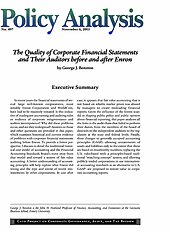In recent years the financial statements of several large well-known corporations, most notably Enron Corporation and WorldCom, have had to be massively restated. Is this indicative of inadequate accounting and auditing rules or evidence of corporate misgovernance and auditor incompetence? Why did these problems occur, and are they widespread? Answers to those and other questions are provided in this paper, which examines historical and current evidence of problems with corporate financial statements auditing before Enron. To provide a better perspective, I discuss in detail the traditional historical cost model of accounting and the Financial Accounting Standards Board’s move away from that model and toward a system of fair value accounting. A better understanding of accounting principles will help explain what Enron did wrong and the type and extent of recent mis-statements by other corporations. In case after case, it appears that fair value accounting that is not based on reliable market prices was abused by managers to create misleading financial reports. Given the influence of the Enron scandal in shaping public policy and public opinion about financial reporting, this paper analyzes all the links in the audit chain that failed to perform their duties, from the members of the board of directors to the independent auditors to the regulators at the state and federal levels. Finally, three changes to generally accepted accounting principles (GAAP)–allowing restatements of assets and liabilities only to the extent that those are based on trustworthy numbers, replacing the U.S. rules-based with a principles-based traditional “matching concept” system, and allowing publicly traded corporations to use international accounting standards as an alternative to U.S. GAAP–are proposed to restore value to corporate accounting reports.
About the Author

This work is licensed under a Creative Commons Attribution-NonCommercial-ShareAlike 4.0 International License.
